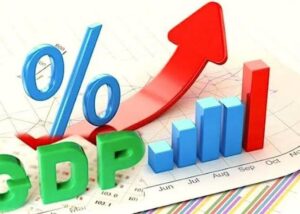Nigeria’s economy showed solid growth in the second quarter of 2024, with the Gross Domestic Product (GDP) increasing by 3.19% compared to the same period last year. This growth outpaced the 2.51% recorded in the second quarter of 2023 and surpassed the 2.98% growth seen in the first quarter of 2024.

The impressive performance in Q2 was largely driven by the Services sector, which grew by 3.79%. This sector was the biggest contributor to the overall GDP, making up 58.76% of the total. In the Agriculture sector, growth was modest at 1.41%, a slight drop from the 1.50% seen in Q2 2023.
Interestingly, the Industry sector rebounded significantly, achieving a growth rate of 3.53%. This is a noteworthy change considering it had suffered a decline of -1.94% in the same quarter of 2023.
In terms of contributions to GDP, both the Industry and Services sectors had a stronger impact in Q2 2024 compared to the previous year. Meanwhile, the oil industry had a mixed performance. It contributed 5.70% to the total GDP in Q2 2024, an improvement from 5.34% in Q2 2023, but down from the 6.38% in the first quarter of 2024.
The oil sector experienced remarkable growth of 10.15% year-on-year in Q2 2024, a dramatic turnaround from the -13.43% decline recorded in the same period last year. However, when looking at the quarter-on-quarter figures, the oil sector faced challenges, showing a decline with a -10.51% growth rate in Q2 2024.
During this quarter, Nigeria’s average daily oil production reached 1.41 million barrels per day (mbpd). This was an improvement over the average of 1.22 mbpd recorded in the same quarter of 2023. However, it was lower than the 1.57 mbpd produced in the first quarter of 2024.
The non-oil sector continues to dominate Nigeria’s economy, accounting for 94.30% of the total GDP in Q2 2024. This is a slight decrease from the 94.66% share recorded in Q2 2023 but shows growth from the 93.62% noted in the first quarter of 2024. In real terms, the non-oil sector grew by 2.80% during Q2 2024, which is 0.78 percentage points lower than the 3.58% growth seen in the same quarter of last year, but the same as the growth rate in the first quarter of this year.
The strong performance of the non-oil sector can be attributed to key areas such as Financial and Insurance services, Telecommunications, Agriculture (notably Crop Production), Trade, and Manufacturing (including Food, Beverage, and Tobacco). These sectors collectively contributed to Nigeria’s positive GDP growth.
Nigeria’s economic indicators for Q2 2024 present a picture of steady growth and recovery, especially in the non-oil sector, showing resilience despite challenges in the oil industry. This growth aligns well with the government’s efforts to diversify the economy and reduce dependence on oil revenues.




